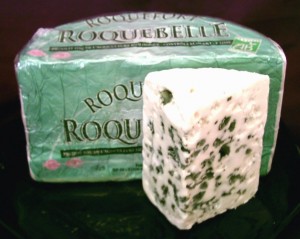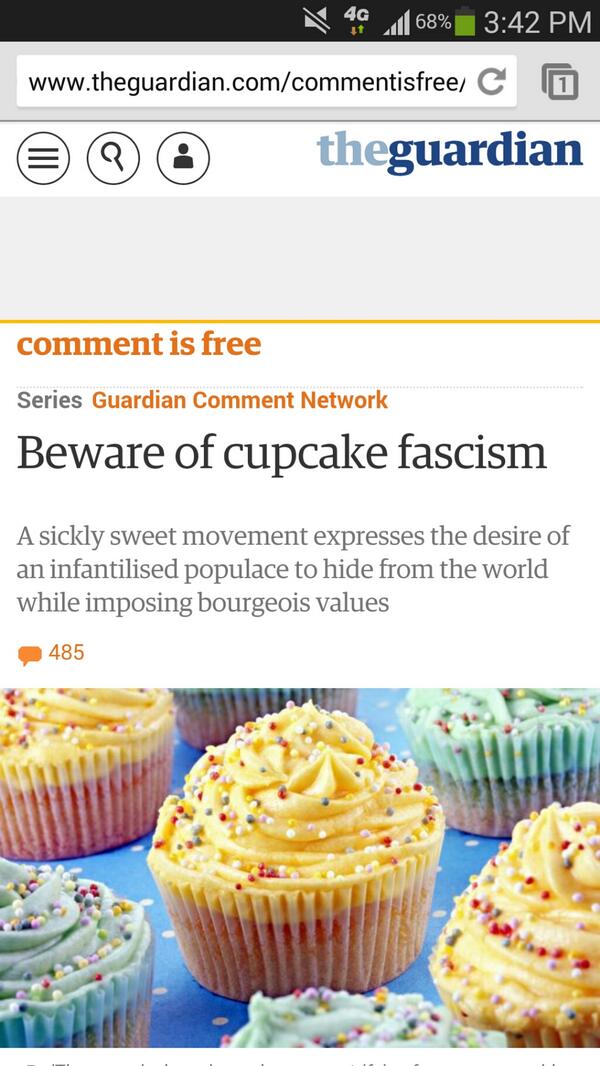- “New York Times Hosts Panel on Farming, Forgets to Invite Farmers” [Julie Gunlock, IWF]
- Historical perspectives on the current attack on food freedom [Baylen Linnekin and Michael Bachmann for the Institute for Justice; report, PDF, and summary; Reason and more Linnekin on the FDA’s odd campaign against added ingredients which also occur naturally]
- Food Safety Modernization Act of 2011 will increase costs and reduce variety in food intended for animals as well as for humans [Jerry Ellig and Richard Williams, Cato Regulation]
- Elyria pink cookie, pride of the Ohio town’s school system, is casualty of federal food rules [Chronicle-Telegram, WEWS] NYC may launch another attack on toys in McDonald’s Happy Meals [Jeff Quinton, earlier]
- UC Berkeley project assists effort to step up labor union presence in food area [Bill McMorris on Food Labor Research Center]
- Lungs are better in the open air: Scotland has at least one haggis food truck [Baylen Linnekin, Vice mag]
- “Eat great on food stamp budget” cookbook is hit, even if fans may not always have thought through its political valence [Maryn McKenna, National Geographic “The Plate”] Push to make food stamp program data public [Slate, USDA comments]
Posts Tagged ‘eat drink and be merry’
Feta-compli?
Class-action lawsuit: supermarket Greek yogurt not actually made in Greece
Nor, the complaint adds triumphantly, is Chobani yogurt even “made by Greek nationals.” It’s made in New York! Also, it’s too sweet and not very natural. [ABA Journal]
Food roundup
- The federal school lunch initiative as experienced by school districts in rural New York [Sarah Harris, North Country Public Radio]
- Europe’s Ugly Fruit movement wants to reclaim for consumers tons of food rejected for appearance, sometimes by marketers and sometimes by regulators [NYT]
- Expect uptick in food labeling suits after Supreme Court decision approving suit in Pom Wonderful v. Coca-Cola [Glenn Lammi, WLF; FedSoc Blog; more, Mayer Brown]
- “Biggest secret” of glutamic acid, of umami and MSG fame, “may be that there was never anything wrong with it at all” [BuzzFeed]
- Cottage food win: New Jersey lawmakers unanimously back right to sell homemade goodies [Institute for Justice]
- Celebrity-driven “Fed Up” film is “strident stalking-horse for a Bloombergian agenda” [Jeff Stier, Baylen Linnekin]
- Young persons, especially college students, drink much more than they used to. Right? Wrong [Michelle Minton, Andrew Stuttaford]
FDA moves to ban cheese aging on wooden boards
We warned at the time that the ill-conceived Food Safety Modernization Act (FSMA) of 2011 would tend to choke off many non-industrial food sources. Now the FDA, interpreting FSMA as part of its regulatory process, is moving to ban the aging of cheese on wooden boards, a process that dates back thousands of years and has been practiced safely by many of the world’s finest cheese makers. The agency apparently intends to apply the same standard to imported cheese as well, which means that in addition to devastating artisanal cheese producers in this country, the move would cut off Americans’ access to large numbers of classic European cheeses, many of which, like Comte and Reblochon, “are required to be aged on wood by their standard of identity.” [Jeanne Carpenter, Cheese Underground (Wisconsin); Matt Spiegler, Cheese Notes]
Our coverage of FSMA, including its many-sided impact on traditional and artisanal farm and food practice, is here.
More: “Old guy in the cell: What are you in for? New guy in the cell: I aged cheese on wooden boards.” [Scott Greenfield] Plus: William Watson, Cato; Greg McNeal, Forbes, on the legalities including an apparent shift in the FDA’s earlier stance approving wood board aging]
Update June 11: agency backs down.
“The Disclosure Debates: Food and Product Labeling”
Last fall the editors of the Vermont Law Review were kind enough to invite me to participate in a discussion on food and product labeling, part of a day-long conference “The Disclosure Debates” with panels on environmental, financial, and campaign disclosure. Other panelists included Christine DeLorme of the Federal Trade Commission, Division of Advertising Practices; Brian Dunkiel, Dunkiel Saunders; George Kimbrell, Center for Food Safety; and David Zuckerman, Vermont State Senator and Farmer, Full Moon Farm.
Aside from my own segment above, you can find links to the other segments here. Plus: Environmental Health (VLS) summary of above panel.
This is it: we’ve reached peak Guardian
“The cupcake has always been a gentrifying force … you could get a huge mass of people to participate in a reactionary endeavour if you dressed it up in nice, twee, cupcakey imagery, and persuaded everyone that the brutality of your ideology was in fact a form of niceness.” — Tom Whyman for Critical Legal Thinking, Guardian “Comment Is Free”, my Tweet h/t @Ben_McGinnis.
Yale wants you to eat a hearty meal
The internet has lit up with the story of the 20-year-old, 92-lb. history major who says she’s been battling the Yale administration over its pressure on her to eat more. [New Haven Register]. Although much of the press coverage seems unaware of the issue, it would not be surprising if changing legal pressures on universities played a role here. Efforts both regulatory and liability-driven have been under way to hold universities accountable for not preventing student suicides, and as a result, many campuses have seen a shift toward more interventionist, rules-driven policies designed to show that the institution was not standing idly by when it knew or had reason to know of early signs of self-harm. (Our file on the topic goes back a decade.) If the list of self-harm behaviors includes eating disorders, you might have a formula for interventions in which very skinny students are placed under pressure to prove they are not anorexic. Evaluating cases like the current one, of course, is difficult for outsiders because of HIPAA and other privacy laws which broadly prohibit the sharing of health-related information, even on topics of public concern.
“No link found between saturated fat and heart disease”
Food roundup
- Warnings dismissed at time: FDA rules implementing FSMA (Food Safety Modernization Act) of 2011 imperil practices common to organic, small growers, “such as using house-made fertilizers and irrigating from creeks” [Los Angeles Times] Oh, how D.C.’s “public-interest” establishment and its co-thinkers in the press jeered when we and others tried to raise such concerns before the bill passed!
- Related: pursuit of locally grown/artisanal meat options collides with USDA regs that put squeeze on small slaughterhouses, overbroad recalls also a problem [Baylen Linnekin, earlier here, here, and here]
- “America’s Obesity Problem: Legal Mechanisms for Prevention,” Duke Law School conference I spoke at (but did not write a paper for) last year, now online [Duke Forum for Law and Social Change].
- Related: “Wellness programs addressing obesity could lead to litigation, lawyers say” [ABA Journal]
- Looser regulation of microbrewing has already proved boon to Maryland, lawmakers now consider extending it further [Beth Rodgers, Frederick News-Post]
- “Bill introduced to undo California’s ‘glove law’ for food preparers” [KPCC; earlier]
- Sorry, I’ll stay home and thumb through old cookbooks instead: recent American Studies Association Food Studies Caucus program included “Food, Debt, and the Anti-Capitalist Imagination,” “Archives of Domesticity and Dissent: Cookbooks, Cooking Culture, and the Limits of Culinary Exchange,” and “Pedagogies of Food and Eating: Teaching Debt, Dissent, and Identity through Food” [Mary Grabar, Pope Center on “food studies” fad]


